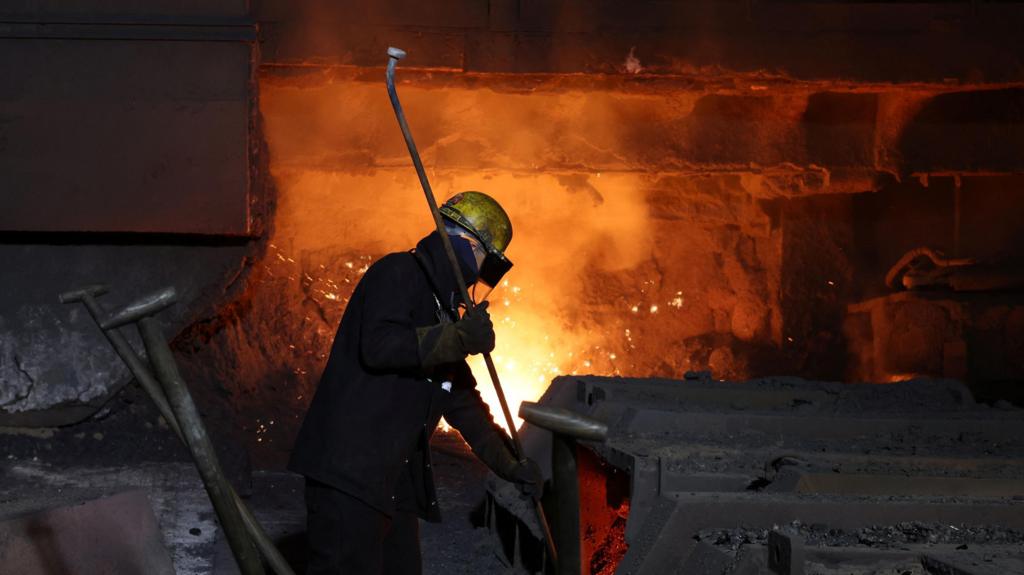The European Union has unveiled plans to significantly increase tariffs on imported steel, a move the UK’s steel industry has warned could represent “perhaps the biggest crisis” it has ever confronted.
The European Commission’s proposal entails halving the amount of steel permitted to be imported into the bloc before the imposition of new tariffs, set at 50%.
The EU stands as the UK’s foremost steel export destination, accounting for nearly £3 billion and representing 78% of steel products manufactured in the UK for international markets.
The Commission’s decision follows pressure from certain member states and their respective steel industries, which have struggled to compete with lower-cost imports from nations such as China and Turkey.
The EU is proposing a reduction in tariff-free import quotas to 18.3 million tonnes annually – a 47% decrease from 2024 levels.
The new measures are slated to take effect early next year, pending approval from a majority of EU member states and the European Parliament.
“We have global over capacity, unfair competition, state aid, and undercutting in prices and we are reacting to that”, stated Stéphane Séjourné, the European Commission’s executive vice president for prosperity and industrial strategy.
“Eighteen thousand jobs were lost in the steel sector in 2024. That’s too many, and we had to put a stop to that”, he told a news conference at the European Parliament in Strasbourg.
This announcement marks another setback for the UK steel industry, following the indefinite suspension in September of a proposed agreement to eliminate tariffs on UK steel exports to the US .
Several firms were already in dire financial straits.
Earlier this year, the government assumed control of Chinese-owned plants in Scunthorpe, while Liberty Steel plants in Rotherham and Stocksbridge were placed under government control last month.
Speaking on his way to India on Tuesday, the prime minister said there would be “strong support” from the government for the British steel industry, which could be severely impacted by EU tariffs.
“I’ll be able to tell you more in due course, but we are in discussions as you’d expect”, Sir Keir Starmer said, refusing to go into the details of any discussion, including whether the UK was seeking exemptions from the rules.
In response to the announcement, Gareth Stace, Director General of UK Steel, emphasized that the government “must go all out to leverage our trading relationship with the European Union to secure UK country quotas or potentially face disaster.”
The European Union’s action is, in part, a reaction to US President Donald Trump’s earlier sharp increases in tariffs on foreign steel, citing concerns about China, and his urging of other nations to implement similar measures.
Canada, Mexico, and Brazil have also taken steps to bolster protections for domestic steelmakers, responding to apprehensions about these firms losing business in the US while simultaneously facing increased competition at home from shipments diverted from America.
Mr. Stace cautioned against the EU’s measures “redirecting millions of tonnes of steel towards the UK,” which could prove “terminal for many of our remaining steel companies.”
The Community Union, representing UK steelworkers, characterized the measures as an “existential threat” to the industry.
When questioned about UK concerns, European Trade Commissioner Maros Sefcovic stated at a press conference that he anticipated “fully engaging” with the UK on this matter, suggesting that a specific UK quota might be negotiated in the future.
In a statement, the Department for Business stated that it was “pushing the European Commission for urgent clarification of the impact of this move on the UK.”
“It’s vital we protect trade flows between the UK and EU and we will work with our closest allies to address global challenges rather than adding to our industries’ woes”, Industry Minister Chris McDonald said.
“This government has shown its commitment to our steel industry by securing preferential access to the US market for our exporters, and we continue to explore stronger trade measures to protect UK steel producers from unfair behaviours.”
The government said the industry minister will meet steel representatives on Thursday to discuss their concerns.
Despite the warm words, Canada remains the only G7 country not to have reached a trade deal with Trump this year.
Plans to spend billions of dollars supporting farmers have frustrated many other kinds of businesses that have also been hurt by tariffs.
Officials say no breakthrough is expected on trade, but the Canadian prime minister is under domestic pressure to secure some form of relief.
The benchmark Nikkei 225 index closed above 47,000 for the first time as investors welcomed Sanae Takaichi’s victory.
Beijing has urged local firms to use homemade chips. But is China ready to turn away from Nvidia?

